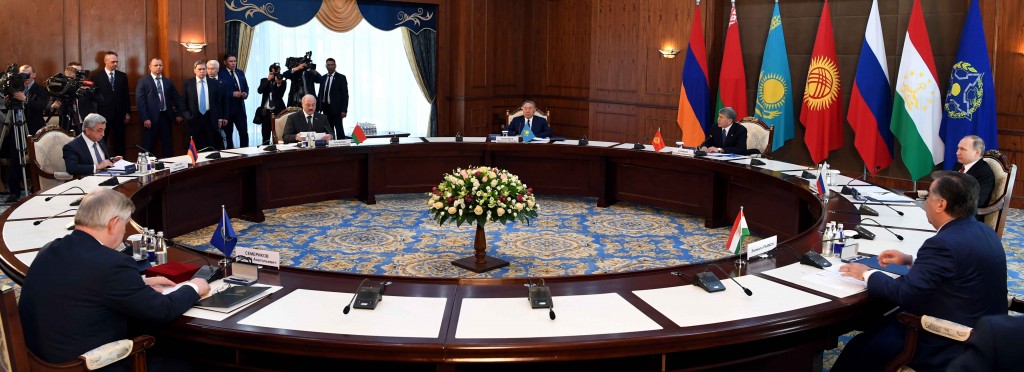ASTANA – Two regional organisations in the economic and security spheres, the Eurasian Economic Union (EAEU) and the Collective Security Treaty Organisation (CSTO), held their top-level meetings April 14 in Bishkek, where key priorities of development and expansion were defined.
Kazakh President Nursultan Nazarbayev attended the meeting of the Supreme Eurasian Economic Council (SEEC) and the informal meeting of the heads of CSTO member states.
The SEEC was also attended by the presidents of Armenia – Serzh Sargsyan, Belarus – Alexander Lukashenko, Kyrgyzstan – Almazbek Atambayev, Russia – Vladimir Putin, as well as Chairperson of the Collegium of the Eurasian Economic Commission (EEC) Tigran Sargsyan.
A report on the implementation of the main directions of international activities of the Eurasian Economic Union (EAEU) in 2015-2016 was presented.
The parties discussed economic cooperation within the EAEU as well as international cooperation and integration within the Eurasian space.
At the meeting of the council, in which Moldovan President Igor Dodon also took part as an invitee, Nazarbayev dwelt on the key aspects of the implementation of the treaty on the EAEU signed three years ago in Astana.
“Contractual and legal frameworks have been established and are regularly being expanded, long- and medium-term priorities of the organisation have been defined. Free movement of goods, services, capital and labour is carried out in practice. Together, we work in the economic sphere, we conduct a coordinated policy in most important sectors of the economy. Contacts are being established with various countries and international organisations,” the Kazakh President said.
At the same time, Nazarbayev noted that during its formation, the EAEU had to overcome crisis situations of the global economy and the challenges of a difficult geopolitical situation.
“All of this has affected our organisation’s performance, which has significantly decreased in recent years. However, crises are not eternal and recessions are followed by growth,” Nazarbayev said.
The Kazakh President stressed that, despite the difficult conditions, most EAEU member states showed an increase in economic indicators last year.
“Particular optimism is prompted by the statistics of the beginning of 2017. The first months of this year showed the volume of EAEU foreign trade has increased by 37 percent and mutual trade by 38 percent,” Nazarbayev concluded.
Also, noting the need to consolidate this positive trend, the head of state singled out priority steps in this direction.
“First, it is important to remove all existing obstacles for EAEU development. Secondly, new trade and economic agreements should be established with international partners to expand sales markets and increase investment. Thirdly, in this difficult period for our economies it is necessary to provide mutual support. Fourthly, the Anti-Crisis Council can become a good tool for overcoming crises,” Nazarbayev noted.
He especially noted Kazakhstan’s proposals on creating the Council of Ministers of Economy and Finance, as well as the composition of the heads of central banks of EAEU countries.
“The council will advise the EAEU authorities on financial and economic policies of member states and development of concerted measures to prevent crises. Its work will be aimed at implementing joint activities to ensure economic growth and financial stability. The work of this council will be similar to the activity of the Council for Financial Stability under the G20 and ECOFIN of the European Commission,” Nazarbayev said.
The parties also considered the issue of granting EAEU observer status as there is great interest from third countries.
During the meeting, the main guidelines of macroeconomic policy of the EAEU states for 2017-2018 were approved. The document provides for significant measures to improve the macroeconomic situation, stimulate the corporate sector to increase investment, promote non-primary exports.
The meeting also adopted a document on a temporary agreement on the formation of a free trade zone between the EAEU and its member states and Iran.
In addition, the heads of state considered the appeal of the Republic of Moldova to grant it the status of observer state under the EAEU.
The informal meeting of CSTO member states on the same day was attended by Sargsyan, Lukashenko, Nazarbayev, Atambayev, Putin, Tajik President Emomali Rahmon, as well as acting CSTO Secretary General Valery Semirikov.
Development of the organisation and deepening of cooperation in the security sphere were discussed.
Nazarbayev noted that this year is a jubilee for CSTO member countries. Congratulating the meeting participants on the 25th anniversary of the signing of the treaty, he particularly emphasised its importance in ensuring national and regional security, as well as in strengthening the integrity of participating states.
He also drew attention to expanding the zone of cooperation between the CSTO and other international institutions and organisations in the field of security.
In addition, the members of the organisation considered the possibility of consolidating efforts in the address regional and global challenges.
At the end of the meeting, the heads of participating states appointed Yuri Khachaturov the Secretary General of the CSTO.

